Banks are institutions that offer a variety of financial services, such as checking, savings, and investment accounts and various loan options. Understanding how banking works and maintaining a good relationship with a bank is crucial when handling your finances.
This guide will explain how banks make money, the different types of banks, and which one may be right for you.
Contents
How Banks Make Money
Banks are a business. Like any business, they must make money to last. Most banks make money in two ways—receiving interest on loans and selling assets.
Borrowing and Lending
Banks borrow money at a lower rate than they lend it to someone else. For example, let’s say a bank borrows $1,000 (from five people’s deposits) for 1% interest per year. Another customer buys a $5,000 car and needs a loan. The bank loans that person the money at 6%. That gives the bank a 5% margin, or $250, in profit.
Banks do that a lot. That is the scale of the old cliché, “It takes money to make money.” If the bank has 1,000,000 customers with $1,000 and loans out 80% of that money (assuming a 20% reserve requirement), it can earn $40 million in profit with a 5% spread. Even if 5% of the loans go bad, it still makes massive profits.
Selling Assets
When banks lend money, whether as loans or other lines of credit, they borrow that cash from other customers’ savings accounts and certificates of deposit. If customers don’t touch these accounts for a while, that is great for the bank. Banks pay the customer a little interest and loan the funds out at a much higher rate.
However, if many customers want their savings back, the bank must give them it. If the money is all loaned out, the bank must borrow from other banks or sell assets.
The primary assets of banks are loans. Loans are considered assets because they are monies the bank expects to receive in the future. It can sell a bundle of loans together to another banking institution or the government for a slight discount. For example, if a bank has $10,000,000 in outstanding loans, another bank might pay $9,500,000 for title to the loans, ensuring the bank is protected from potential losses on future loans.
Types of Banking Institutions
You can hold your money in many different places, but most people choose one or more of these three options when it comes to banking.
- Credit union: A credit union is a financial institution its customers own as a co-op. Each member votes on board members and significant changes to the institution. They are not-for-profit and generally consumer-focused companies with little or no business offerings. Because they are cooperative-owned financial institutions, they typically charge low fees and have competitive interest rates for loan and credit accounts.
- Online banks: Online banks are financial institutions where customers can make online financial transactions through a website or a smartphone app.
- Big banks: Big banks are large financial institutions that can offer a full line of banking products, unlike most smaller, localized banks. Most big banks will have checking, savings, CD, money market, safe deposit, car loan, home loan, business account, credit card, and debit card options.
What Kind of Bank Is Right For Me?
With all these banking options at your fingertips, you may wonder which kind of bank is right for you. Ask yourself the following questions to determine which bank fits your circumstances best.
Credit Unions
Do you have pretty simple needs? Are you someone happy with a checking account, savings account, and an ATM at your bank branch? Do you stay around home and have a limited need for mobile banking?
If you said yes to those questions, you are a perfect candidate for a credit union. If your banking needs are limited to what a typical checking and savings account offers, you don’t need to waste time or money with a big bank. Credit unions usually have lower fees and better customer service, so this is the route for you.
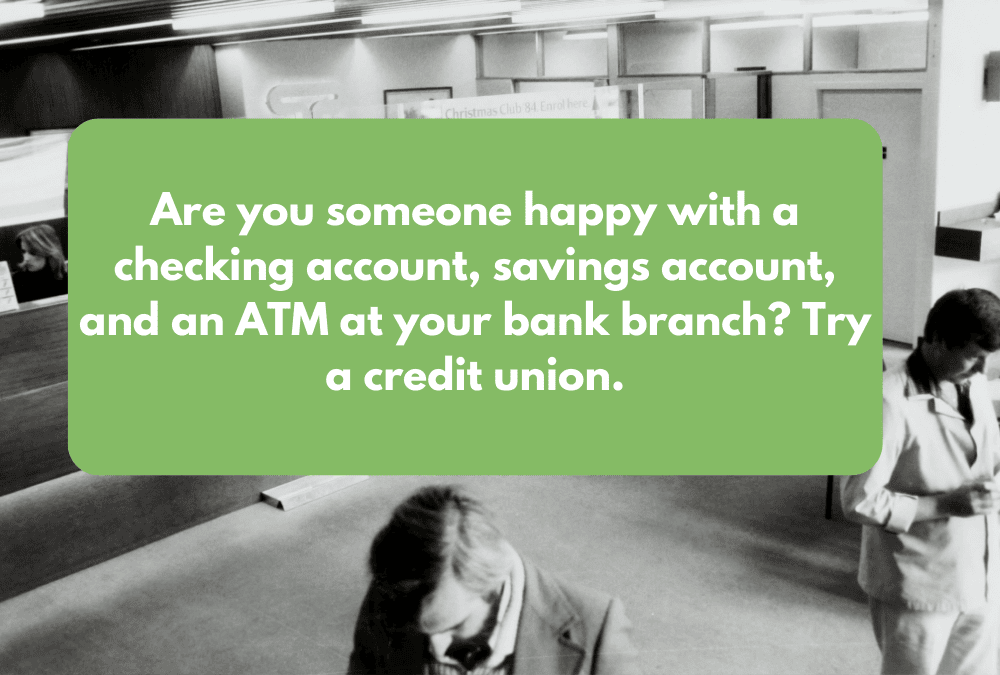
Online Banks
Do you have a complicated account structure? Do you need to link up your checking, savings, investments, PayPal, and multiple credit cards, plus use your accounts as an automated funnel for your finances? Do you need online and mobile access to your accounts 24/7? Do you hate cash and wish everyone would split the bill with credit cards to make it easier?
If those questions describe you, you may want an online bank. I rarely use cash and hate splitting the bill with people who refuse to use a card. I like transferring money with my phone and depositing checks with my camera. I also have many accounts with different purposes, and my online bank works great for transferring and automating my money.
Big Banks
Do you like cash and easy ATM access? Do you make regular deposits in person? Do you want to keep things simple and under one roof?
If you like the simplicity of dealing with one bank and enjoy having physical banks and ATMs everywhere, you would probably be happy at Chase, Citi, Bank of America, US Bank, Wells Fargo, or one of the other big box banks.
These banks are not known for customer service or low costs, but they are everywhere and have every service you might need.
Is Banking In One Place A Good Idea?
I have tried different combinations of accounts in my life. My credit card, brokerage, checking, and savings have all been at various places before. And sometimes, everything was in one place. I found some significant benefits to both scenarios.
The Benefits of Banking In One Place
Save Time
The biggest benefit of having everything in one place is the time savings. Assuming you use a site like Mint or Adaptu, you are already tracking everything in one place. Even if you take advantage of one of those free services, there are other time savers to having things in one place.
For starters, you only need one customer service contact for various issues. Are you changing your address? One form. Need online bank statements? One website, often one statement. Need to pay your credit card and other bills? One bill pay site to visit.
You can also transfer money instantly between accounts, which is helpful if you need to move money around quickly. Moving between banks can take up to three days with the ACH system.
Save Money
Keeping everything under one roof can also save you money. Many banks offer special deals to customers with multiple accounts. There’s no need to worry about inactivity fees at one bank while your main account is elsewhere. And, you are less likely to miss a credit card payment if it is at the bank website you use every day.
Banks are also more likely to waive fees for good customers. For example, I once had to send a bank wire from my checking account. A wire fee was $20, but they waived it (without my asking) because I have had a good relationship with the company.
The Benefits of Banking In Multiple Places
More Control
While it is nice to have instant transfers and keep everything in one place, it is not always a good idea to keep everything together, primarily because you won’t have as much control of your accounts.
As a banker, I once had a customer that screwed up badly. She didn’t make payments on her debt for months, answer our calls, answer her mail, or reach out to us. She owed a few thousand dollars, and the bank didn’t want to have to write it all off. It’s likely she didn’t notice that we had the right to take money from her checking or savings account to pay the delinquent bills that she owed us according to her loan agreement, which the bank eventually did.
Do not have your direct deposit going into a bank account at a bank to which you owe money. If you are not paying off your debt and get a direct deposit, the bank can (and likely will) garnish your paycheck to pay off the outstanding debt, even without asking first. There may be terms in your loan agreement that allow the bank to do that.
Easier to Remedy Issues
If you experience bad customer service from your credit card company, it is easy enough to move your account. If you have a poor experience at your bank and only have one account there, it’s not that big of a deal.
But if everything is at one bank, you are stuck. You don’t have any recourse if you have bad service or an irreconcilable problem. You can always try a manager or try for a ‘good customer’ refund or discount, but you can’t really control anything.
The Final Word on Banking
Banks seek to build customer relationships and cover all of the customer’s banking needs, including checking and savings accounts, credit cards, and loans.
If you’re looking for a bank, carefully consider your financial situation, habits, and goals to determine which one may be right for you.
